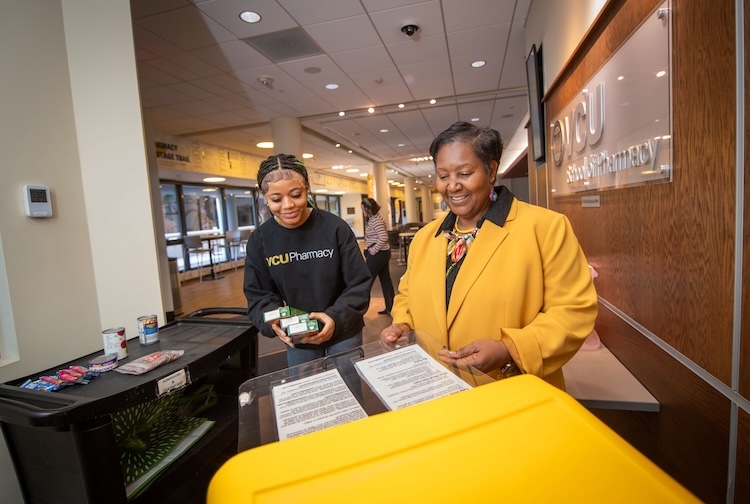VCU liver institute expands international ties to train next generation of specialists
Collaboration in India is the latest new partnership in South Asia to help hepatologists fight a worldwide health menace.
August 15, 2023 VCU Stravitz-Sanyal Institute for Liver Disease and Metabolic Health director Arun Sanyal, M.D. (l), with Abhijit Chowdhury, M.D., of the Liver Foundation, West Bengal; and Arnab Basu, M.D., of the Friends of the Liver Foundation, West Bengal. (Contributed photo from the Liver Foundation, West Bengal)
VCU Stravitz-Sanyal Institute for Liver Disease and Metabolic Health director Arun Sanyal, M.D. (l), with Abhijit Chowdhury, M.D., of the Liver Foundation, West Bengal; and Arnab Basu, M.D., of the Friends of the Liver Foundation, West Bengal. (Contributed photo from the Liver Foundation, West Bengal)
By A.J. Hostetler
As obesity and diabetes rise worldwide and increase rates of liver disease, Virginia Commonwealth University's Stravitz-Sanyal Institute for Liver Disease and Metabolic Health continues to expand its international collaborations to train the liver specialists of the future.
Arun Sanyal, M.D., a professor at the VCU School of Medicine and director of the liver institute, joined colleagues and U.S. officials in Kolkata, India, on July 31 to mark the memorandum of understanding with the Liver Foundation, West Bengal. The agreement seeks to encourage the partners' efforts to exchange and build knowledge of liver disease, which affects about one-third of South Asians.
The VCU liver institute has formalized similar arrangements with the University of São Paulo's medical school in Brazil, Recep Tayyip Erdoğan University in Turkey and the Institute of Liver and Biliary Sciences in India. It also is pursuing other educational/training opportunities with academic and research organizations, including those in Southeast Asia, another region of the globe with high rates of liver disease.
"Impact-focused collaborations like this are driving VCU's growing reputation for research," said Fotis Sotiropoulos, Ph.D., provost and senior vice president for academic affairs, who signed the agreements on behalf of VCU. “VCU's ranking as one America's top 50 public research universities was earned by focusing on real-world challenges like the growing risks of liver disease and training the specialists who will be serving people across our community and across our world.”
The agreements allow trainees to visit the VCU liver institute to learn and work alongside its world-class liver specialists, gaining comprehensive clinical and research experience in gastroenterology, transplant hepatology and transplant surgery. VCU's gastroenterology/hepatology program is ranked 17th in the world by U.S. News & World Report in 2022, based on academic research performance.
“Our collaborations with our academic partner institutions across the world are a foundation to actualize our vision of like-minded academic physicians, educators and scientists across the world to work together toward our common goal of improving liver and metabolic health and to reduce the burden of liver disease,” Sanyal said.
“This network, which spans collaborations in Latin America to the Middle East to South Asia and the Far East, will allow us to better understand disease biology in different regions of the world, facilitate our ability to learn from each other's experiences, train the next generation of investigators and impact the health of people in all of these regions, thus actualizing our mission to lead liver-related care and improve the liver health of people worldwide,” he added.
Abhijit Chowdhury, M.D., chief mentor of the Liver Foundation, West Bengal and clinical director of its research arm, the Indian Institute of Liver and Digestive Sciences, said the collaboration holds promise not just for educational exchanges but for the health and well-being of India and the U.S.
“This would definitely enhance research and service capacities of the institutes that the foundation runs, fostering its abilities to serve Indian people through exploration and exercise of new knowledge and exercise of methods that are state-of-the-art, deliver care with precision and are contextually relevant,” Chowdhury said. “This would further enable it to emerge as an epicenter of learning through research fostering the capability of the new generation of hepatologists in India.”
Sanyal said the Liver Foundation, West Bengal is the leader in hepatology science and patient care in South Asia, particularly in rural regions.“I hope that our collaboration will accelerate our ability to translate our learnings into novel and practical care paradigms that will help patients with liver and metabolic disease both in South Asia and around the world.”
In a report released in June, the Association of American Universities, an organization of leading research universities working to promote a strong system of academic research and education, recommended that U.S. and India be “more intentional” about expanding their partnerships, establishing new joint research institutes and scaling up student-based research collaboration and exchanges.
The report noted the opportunities around India's population growth (with people under 25 accounting for more than 40% of India's estimated population of 1.4 billion), the country's fast-growing economy as well as India's National Education Policy opening doors for transnational education and research collaboration.
VCU and VCU Health liver specialists will visit Kolkata in a few months to provide training at the Liver Foundation, West Bengal. In October, Sanyal will visit the University of São Paulo, which will then send 20 physicians from the university to visit the VCU institute next March for its pilot program to train alongside VCU clinical and research gastroenterologists and hepatologists. In December, Sanyal will travel to the National University of Singapore to finalize a similar agreement with the leadership there.
Jill Blondin, Ph.D., associate vice provost for global initiatives at VCU, and her team have traveled abroad with VCU leadership in the past two years to look at ways to partner with schools in other countries, including institutions in India. They are seeking academic partners for research, one-plus-one master's degrees as well as reciprocal exchanges of students for study.
“These international partnerships are a testament to the work that the Stravitz-Sanyal Liver Institute has done to create a global community for liver health,” she said.




